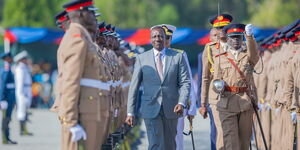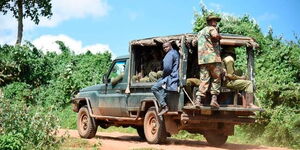Haiti police are said to be one of the world's underfunded, understaffed, corrupt, and ill-equipped forces.
In fact, Haitian police, in early 2023, resorted to demonstrating for their well-being while demanding their grievances be addressed. The officers blocked roads, torched tires across Port-au-Prince and seized vehicles while demanding tougher crackdowns on influential and violent gangs.
They also called an end to Prime Minister Ariel Henry's reign - an incident that has never been witnessed in Kenya.
Thus, Kenya's decision to deploy 1,000 police officers to quell violence in Haiti and restore law and order was met with mixed reactions.
As the international community led by the United Nations warmly embraced Kenya, human rights activists and security stakeholders condemned what they argued was a controversial and impulsive decision.
The activists questioned Kenya's preparedness to handle geographical, language and cultural barriers, among other challenges.
With scarce answers and a lack of clarity, the Kenyan government finds itself under pressure to justify why it accepted the UN's plea to send local police to the Caribbean nation, whose economy has collapsed and 60 per cent of the nation's capital, Port-au-Prince, is under the control of criminal gangs.
Questions also arose on whether the Kenyan police can go toe-to-toe and successfully subdue the Haitian gangs that have dominated the nation since the assassination of President Jovenel Moïse in July 2021.
The recent gang-related violence in Haiti forced over 3,000 officers to leave the police service in the past two years, with the officers fearing for their lives.
Out of this, an estimated 15,498 officers remain on duty, according to a statement released by Francisco Occil, Haiti's police spokesperson, in February 2023.
As apprehension grows regarding whether Kenyan officers will be up to the task, Kenyans.co.ke takes a look at the disparities between the two police services.
Qualifications
To enrol in the Kenya Police Service, recruits must hold a Kenya National Identity Card, have a minimum qualification of D+ in the KCSE examination, and be between 18 and 28 years old.
They must also be physically, mentally and medically fit and have no pending criminal case.
On the other hand, Haiti police officers are required to appear for an entrance examination to be held at the departmental offices and demonstrate knowledge of general subjects such as Geography, History, Mathematics and writing ability.
The candidates are shortlisted after they prove that they are Haitian citizens between the ages of 18 and 30 years and have a minimum height of between 1.6 metres and 1.67 meters for women and men, respectively.
The candidate should also have a clean criminal record and possess a minimum intellectual level in grade nine exams.
Weapons
There has been a growing concern that Haitian police lack modern equipment and vehicles, hampering their ability to counter criminal activities.
However, critics counted this perspective, arguing that the officers need a robust government to assert authority and enact better policies rather than purchase more weapons and upgrade the police force.
The officers are normally equipped with hoods, flak jackets (sleeveless jackets made of heavy fabric reinforced with metal to protect against bullets) and automatic weapons.
In Kenya, the police are supplied with sophisticated guns including Spanish-made CZ Scorpion EVO 3 A1 airsoft rifles, Belgian-made FN SCAR rifles and German-made G3 and MP5 rifles.
Questions, however, linger on whether Kenya's firepower can overpower Haitian gangs who have access to high-powered rifles.
One of the reasons that also led to the rise in the criminal networks in the nation was the infiltration of the gangs within the police service, which was attributed to the government's failure to protect the officers, leaving them outgunned and overpowered.
Salary
Low-grade officers in Haiti are paid less than Ksh30,000 a month, leading to the majority reportedly colluding with the gangs to earn a better living.
On the other hand, a newly recruited police officer earns a monthly salary of Ksh21,645, while a long-serving constable gets between Ksh38,975 and Ksh40,354.
The push by the Kenyan government to solve the crisis in Haiti is perceived as a daring move as no other country, including the United States, has in the past been able to contain the situation.
Over the years, Haitian Prime Minister Henry had requested international military support to aid the government in regaining control of the territory from the gangs, but the Western nations were reluctant.
Months later, Kenya's Foreign Affairs Ministry announced that 1,000 officers would be sent to the nation to assist in battling the criminal gangs.
The United Nations Security Council ratified the decision. Additionally, the US pledged Ksh14.5 billion for the mission, with Secretary of State Antony Blinken assuring that the Joe Biden administration is keen on ensuring the mission is successful.












